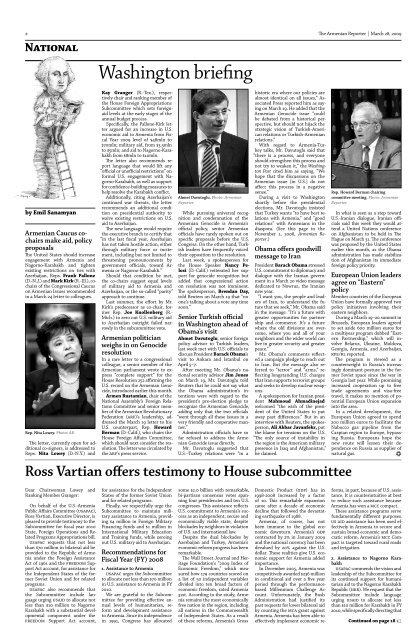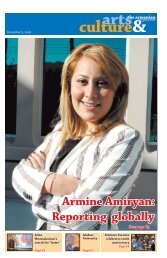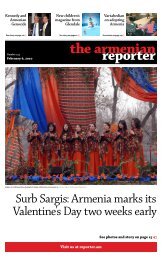National, International, Armenia, and Community News and Opinion
National, International, Armenia, and Community News and Opinion
National, International, Armenia, and Community News and Opinion
You also want an ePaper? Increase the reach of your titles
YUMPU automatically turns print PDFs into web optimized ePapers that Google loves.
The <strong>Armenia</strong>n Reporter | March 28, 2009<br />
<strong>National</strong><br />
Washington briefing<br />
by Emil Sanamyan<br />
<strong>Armenia</strong>n Caucus cochairs<br />
make aid, policy<br />
proposals<br />
The United States should increase<br />
engagement with <strong>Armenia</strong> <strong>and</strong><br />
Nagorno-Karabakh <strong>and</strong> tighten<br />
existing restrictions on ties with<br />
Azerbaijan, Reps. Frank Pallone<br />
(D.-N.J.) <strong>and</strong> Mark Kirk (R.-Ill.), cochairs<br />
of the Congressional Caucus<br />
on <strong>Armenia</strong>n Issues recommended<br />
in a March 24 letter to colleagues.<br />
Rep. Nita Lowey. Photo: AP.<br />
The letter, currently open for additional<br />
co-signers, is addressed to<br />
Reps. Nita Lowey (D.-N.Y.) <strong>and</strong><br />
Kay Granger (R.-Tex.), respectively<br />
chair <strong>and</strong> ranking member of<br />
the House Foreign Appropriations<br />
Subcommittee which sets foreignaid<br />
levels at the early stages of the<br />
annual budget process.<br />
Specifically, the Pallone-Kirk letter<br />
argued for an increase in U.S.<br />
economic aid to <strong>Armenia</strong> from Fiscal<br />
Year 2009 level of $48mln to<br />
$70mln; military aid, from $3.5mln<br />
to $5mln; <strong>and</strong> aid to Nagorno-Karabakh<br />
from $8mln to $10mln.<br />
The letter also recommends report<br />
language that would lift any<br />
“official or unofficial restrictions” on<br />
formal U.S. engagement with Nagorno-Karabakh,<br />
as well as support<br />
for confidence-building measures to<br />
help resolve the Karabakh conflict.<br />
Additionally, citing Azerbaijan’s<br />
continued war threats, the letter<br />
recommends an additional condition<br />
on presidential authority to<br />
waive existing restrictions on U.S.<br />
aid to Azerbaijan.<br />
The new language would require<br />
the executive branch to certify that<br />
“in the last fiscal year, Azerbaijan<br />
has not taken hostile action, either<br />
through military force or incitement,<br />
including but not limited to<br />
threatening pronouncements by<br />
government officials, toward <strong>Armenia</strong><br />
or Nagorno-Karabakh.”<br />
Should that condition be met,<br />
the co-chairs suggest equal levels<br />
of military aid to <strong>Armenia</strong> <strong>and</strong><br />
Azerbaijan, or the so-called “parity”<br />
approach to continue.<br />
Last summer, the effort by Mr.<br />
Kirk’s predecessor as co-chair, former<br />
Rep. Joe Knollenberg (R.-<br />
Mich.) to zero out U.S. military aid<br />
to Azerbaijan outright failed narrowly<br />
in the subcommittee vote.<br />
<strong>Armenia</strong>n politician<br />
weighs in on Genocide<br />
resolution<br />
In a rare letter to a congressional<br />
colleague, a senior member of the<br />
<strong>Armenia</strong>n parliament wrote to express<br />
“complete support” for the<br />
House Resolution 252 affirming the<br />
U.S. record on the <strong>Armenia</strong>n Genocide,<br />
introduced earlier this month.<br />
Armen Rustamian, chair of the<br />
<strong>National</strong> Assembly’s Foreign Relations<br />
Committee <strong>and</strong> senior member<br />
of the <strong>Armenia</strong>n Revolutionary<br />
Federation (ARF)’s leadership, addressed<br />
the March 19 letter to his<br />
U.S. counterpart, Rep. Howard<br />
Berman (D.-Calif.), who chairs the<br />
House Foreign Affairs Committee,<br />
which should next consider the resolution.<br />
The letter was circulated by<br />
the ARF’s press service.<br />
Ahmet Davutoglu. Photo: <strong>Armenia</strong>n<br />
Reporter.<br />
While pursuing universal recognition<br />
<strong>and</strong> condemnation of the<br />
<strong>Armenia</strong>n Genocide is <strong>Armenia</strong>’s<br />
official policy, senior <strong>Armenia</strong>n<br />
officials have rarely spoken out on<br />
specific proposals before the U.S.<br />
Congress. On the other h<strong>and</strong>, Turkish<br />
leaders have frequently voiced<br />
their opposition to the resolution.<br />
Last week, a spokesperson for<br />
the House Speaker Nancy Pelosi<br />
(D.-Calif.) reiterated her support<br />
for genocide recognition but<br />
added that congressional action<br />
on resolution was not imminent.<br />
The spokesperson, Brendan Day,<br />
told Reuters on March 19 that “no<br />
one’s talking about a vote any time<br />
soon.”<br />
Senior Turkish official<br />
in Washington ahead of<br />
Obama’s visit<br />
Ahmet Davutoglu, senior foreign<br />
policy advisor to Turkish leaders,<br />
last week met with U.S. officials to<br />
discuss President Barack Obama’s<br />
visit to Ankara <strong>and</strong> Istanbul on<br />
April 5–7.<br />
After meeting Mr. Obama’s national<br />
security advisor Jim Jones<br />
on March 19, Mr. Davutoglu told<br />
Reuters that he could not say what<br />
the Obama administration’s intentions<br />
were with regard to the<br />
president’s pre-election pledge to<br />
recognize the <strong>Armenia</strong>n Genocide,<br />
adding only that the two officials<br />
“went through all these issues in a<br />
very friendly <strong>and</strong> cooperative manner.”<br />
Administration officials have so<br />
far refused to address the <strong>Armenia</strong>n<br />
Genocide issue directly.<br />
Mr. Davutoglu suggested that<br />
U.S.–Turkey relations were “in a<br />
historic era where our policies are<br />
almost identical on all issues,” Associated<br />
Press reported him as saying<br />
on March 19. He added that the<br />
<strong>Armenia</strong>n Genocide issue “could<br />
be debated from a historical perspective,<br />
but should not hijack the<br />
strategic vision of Turkish-American<br />
relations or Turkish-<strong>Armenia</strong>n<br />
relations.”<br />
With regard to <strong>Armenia</strong>-Turkey<br />
talks, Mr. Davutoglu said that<br />
“there is a process, <strong>and</strong> everyone<br />
should strengthen this process <strong>and</strong><br />
not try to weaken it,” the Washington<br />
Post cited him as saying. “We<br />
hope that the discussions on the<br />
<strong>Armenia</strong>n issue [in U.S.] do not<br />
affect this process in a negative<br />
sense.”<br />
During a visit to Washington<br />
shortly before the presidential<br />
elections, Mr. Davutoglu insisted<br />
that Turkey wants “to have best relations<br />
with <strong>Armenia</strong>,” <strong>and</strong> “good<br />
relations” with <strong>Armenia</strong>ns in the<br />
diaspora. (See this page in the<br />
November 1, 2008, <strong>Armenia</strong>n Reporter.)<br />
Obama offers goodwill<br />
message to Iran<br />
President Barack Obama stressed<br />
U.S. commitment to diplomacy <strong>and</strong><br />
dialogue with the Iranian government<br />
in a March 20 video message<br />
dedicated to Nowruz, the Iranian<br />
new year.<br />
“I want you, the people <strong>and</strong> leaders<br />
of Iran, to underst<strong>and</strong> the future<br />
that we seek,” Mr. Obama said<br />
in the message. “It’s a future with<br />
greater opportunities for partnership<br />
<strong>and</strong> commerce. It’s a future<br />
where the old divisions are overcome,<br />
where you <strong>and</strong> all of your<br />
neighbors <strong>and</strong> the wider world can<br />
live in greater security <strong>and</strong> greater<br />
peace.”<br />
Mr. Obama’s comments reflected<br />
a campaign pledge to reach out<br />
to Iran. But the message also referred<br />
to “terror” <strong>and</strong> “arms,” reflecting<br />
longst<strong>and</strong>ing U.S. charges<br />
that Iran supports terrorist groups<br />
<strong>and</strong> seeks to develop nuclear weapons.<br />
A spokesperson for Iranian president<br />
Mahmoud Ahmadinejad<br />
welcomed “the wish of the president<br />
of the United States to put<br />
away past differences.” But in an<br />
interview with Reuters, the spokesperson,<br />
Ali Akbar Javanfekr, put<br />
the blame for tensions on the U.S.<br />
“The only source of instability in<br />
the region is the American military<br />
presence in Iraq <strong>and</strong> Afghanistan,”<br />
he claimed.<br />
Ross Vartian offers testimony to House subcommittee<br />
Rep. Howard Berman chairing<br />
committee meeting. Photo: <strong>Armenia</strong>n<br />
Reporter.<br />
In what is seen as a step toward<br />
U.S.-Iranian dialogue, Iranian officials<br />
said this week they would attend<br />
a United Nations conference<br />
on Afghanistan to be held in The<br />
Hague on March 31. The conference<br />
was proposed by the United States<br />
earlier this month, as the Obama<br />
administration has made stabilization<br />
of Afghanistan its immediate<br />
foreign policy priority.<br />
European Union leaders<br />
agree on “Eastern”<br />
policy<br />
Member countries of the European<br />
Union have formally approved two<br />
policy initiatives involving their<br />
eastern neighbors.<br />
During a March 19–20 summit in<br />
Brussels, European leaders agreed<br />
to set aside 600 million euros for<br />
a multiyear program dubbed “Eastern<br />
Partnership,” which will involve<br />
Belarus, Ukraine, Moldova,<br />
Georgia, <strong>Armenia</strong>, <strong>and</strong> Azerbaijan,<br />
RFE/RL reported.<br />
The program is viewed as a<br />
counterweight to Russia’s increasingly<br />
dominant posture in the former<br />
Soviet space since the war in<br />
Georgia last year. While promising<br />
increased cooperation up to free<br />
trade agreements <strong>and</strong> visa-free<br />
travel, it makes no mention of potential<br />
European Union expansion<br />
into the area.<br />
In a related development, the<br />
European Union agreed to spend<br />
200 million euros to facilitate the<br />
Nabucco gas pipeline from the<br />
Caspian region to Europe, bypassing<br />
Russia. Europeans hope the<br />
new route will lessen their dependence<br />
on Russia as supplier of<br />
natural gas.<br />
f<br />
Dear Chairwoman Lowey <strong>and</strong><br />
Ranking Member Granger:<br />
On behalf of the U.S.-<strong>Armenia</strong><br />
Public Affairs Committee (USAPAC),<br />
Ross Vartian, Executive Director, is<br />
pleased to provide testimony to the<br />
Subcommittee for fiscal year 2010<br />
State, Foreign Operations <strong>and</strong> Related<br />
Programs Appropriations bill.<br />
USAPAC requests that not less<br />
than $70 million in bilateral aid be<br />
provided to the Republic of <strong>Armenia</strong><br />
under the Foreign Assistance<br />
Act of 1961 <strong>and</strong> the FREEDOM Support<br />
Act account, for assistance for<br />
the Independent States of the former<br />
Soviet Union <strong>and</strong> for related<br />
programs.<br />
USAPAC also recommends that<br />
the Subcommittee include language<br />
urging USAID to allocate not<br />
less than $10 million to Nagorno<br />
Karabakh with a substantial developmental<br />
component under the<br />
FREEDOM Support Act account,<br />
for assistance for the Independent<br />
States of the former Soviet Union<br />
<strong>and</strong> for related programs.<br />
Finally, we respectfully urge the<br />
Subcommittee to maintain military<br />
assistance to <strong>Armenia</strong>, providing<br />
$4 million in Foreign Military<br />
Financing funds <strong>and</strong> $1 million in<br />
<strong>International</strong> Military Education<br />
<strong>and</strong> Training funds, while zeroing<br />
out U.S. military aid to Azerbaijan.<br />
Recommendations for<br />
Fiscal Year (FY) 2008<br />
1. Assistance to <strong>Armenia</strong><br />
USAPAC urges the Subcommittee<br />
to allocate not less than $70 million<br />
in U.S. assistance to <strong>Armenia</strong> in FY<br />
2010.<br />
We are grateful to the Subcommittee<br />
for providing effective annual<br />
levels of humanitarian, reform<br />
<strong>and</strong> development assistance<br />
to <strong>Armenia</strong>. Since its independence<br />
in 1991, Congress has allocated<br />
some $2.0 billion with remarkable,<br />
bi-partisan consensus votes spanning<br />
four presidencies <strong>and</strong> ten U.S.<br />
congresses. This assistance reflects<br />
U.S. commitment to <strong>Armenia</strong>’s success<br />
as an independent, secure <strong>and</strong><br />
economically viable state, despite<br />
blockades by neighbors in violation<br />
of U.S. <strong>and</strong> international law.<br />
Despite the dual blockades by<br />
Azerbaijan <strong>and</strong> Turkey, <strong>Armenia</strong>’s<br />
economic reform progress has been<br />
remarkable.<br />
The Wall Street Journal <strong>and</strong> Heritage<br />
Foundation’s “2009 Index of<br />
Economic Freedom,” which measured<br />
how 179 countries scored on<br />
a list of 50 independent variables<br />
divided into ten broad factors of<br />
economic freedom, rated <strong>Armenia</strong><br />
31st. According to the study, <strong>Armenia</strong><br />
remains the most economically<br />
free nation in the region, including<br />
all nations in the Commonwealth<br />
of Independent States. As a result<br />
of these reforms, <strong>Armenia</strong>’s Gross<br />
Domestic Product (GDP) has in<br />
1998-2008 increased by a factor<br />
of 10. This remarkable expansion<br />
came after a decade of economic<br />
decline that followed the devastating<br />
earthquake of 1988.<br />
<strong>Armenia</strong>, of course, has not<br />
been immune to the global economic<br />
downturn. <strong>Armenia</strong>’s GDP<br />
contracted by 2% in January 2009<br />
<strong>and</strong> the national currency has been<br />
devalued by 20% against the U.S.<br />
dollar. These realities give U.S. economic<br />
support for <strong>Armenia</strong> added<br />
importance.<br />
In December 2005, <strong>Armenia</strong> was<br />
competitively awarded $236 million<br />
in conditional aid over a five year<br />
period through the performancebased<br />
Millennium Challenge Account.<br />
Unfortunately, the Bush<br />
Administration had justified its<br />
past requests for lower bilateral aid<br />
by counting the MCA grant against<br />
<strong>Armenia</strong>. <strong>Armenia</strong> has been able to<br />
effectively implement economic reforms,<br />
in part, because of U.S. assistance.<br />
It is counterintuitive at best<br />
to reduce such assistance because<br />
<strong>Armenia</strong> has won a MCC compact.<br />
These assistance programs serve<br />
fundamentally different purposes.<br />
US AID assistance has been used effectively<br />
in <strong>Armenia</strong> to secure <strong>and</strong><br />
sustain broad economic <strong>and</strong> democratic<br />
reform. <strong>Armenia</strong>’s MCC Compact<br />
is targeted toward rural roads<br />
<strong>and</strong> irrigation.<br />
2. Assistance to Nagorno Karabakh<br />
USAPAC commends the vision <strong>and</strong><br />
leadership of the Subcommittee for<br />
its continued support for humanitarian<br />
aid to the Nagorno Karabakh<br />
Republic (NKR). We request that the<br />
Subcommittee include language<br />
urging USAID to allocate not less<br />
than $10 million for Karabakh in FY<br />
2010, while specifically directing that<br />
Continued on page 18 m

















